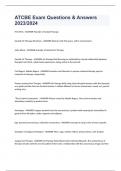ATCBE Exam Questions & Answers
2023/2024
Fritz Perls - ANSWER-Founder of Gestalt Therapy
Gestalt Art Therapy Directives - ANSWER-Abstract self, life-space, self in environment...
Janie Rhyne - ANSWER-Founder of Gestalt Art Therapy
Gestalt Art Therapy - ANSWER-Art therapy field focusing on authenticity, mutual relationship between
therapist and client, whole body experiences, being active in the present.
Carl Rogers, Natalie Rogers - ANSWER-Founders and theorists in person-centered therapy, person-
centered art therapy, respectively.
Person-centered Art Therapy - ANSWER-Art therapy field using client-directed sessions with the therapist
as a guide and the client as the best teacher. It utilizes different art forms (movement, sound, art, journal
writing, etc.).
"The Creative Connection" - ANSWER-Phrase coined by Natalie Rogers. One art form fosters and
stimulates creativity in another form.
Archetype - ANSWER-Jungian symbols from the unconscious; symbols with meaning for humankind in
general from fairytales, myths, legends and religions.
Ego, personal unconscious, collective unconscious - ANSWER-Concepts in Jung's view of man's psyche.
Examples of Jungian Archetypes - ANSWER-Hero, sage, mother, father, anima/animus, self, shadow
Jungian Art Therapy - ANSWER-Art therapy field influenced by Michael Edwards. The central focus of
therapy remains with the art, the patient enters into a relationship with the unconscious image and free
,association can begin from anywhere. True symbols produced unconsciously or in dreams represent and
express an intuitive idea or have meaning that cannot yet be formulated in any other better way.
Goal in Jungian Art Therapy - ANSWER-Balance between self and ego (ego-self axis).
True Object - ANSWER-A person who is valued and related to in his or her own right (Kohut, Self
Psychology).
Self Object - ANSWER-Person or thing valued for its function in enhancing oneself ("parent imago" in Self
Psychology, Kohut). Art can become one as opposed to the therapist.
Narcissistic Personality in Self Psychology - ANSWER-Personality type in which everything remains a self
object as opposed to transitioning to a true object.
Art Self Psychology - ANSWER-Art therapy field influenced by Mildred Lachman-Chapin based on field
influenced by Heinz and Kohut. Art is viewed as a self-expression and transmuting internalization, a
transitional object for ego strength.
Primary Narcissism - ANSWER-Early stage in Self Psychology
"Previous Perfection" - ANSWER-Concept in Self Psychology; grandiose, exhibitionist image of self and
admired omnipotent self-object (parent imago); gradually tamed to adult personality through mirror
transferences.
Normal Autism - ANSWER-First stage in Object Relations Theory, blissful oneness with mother.
Individuation - ANSWER-Process in Object Relations Theory, "me" and "you" get defined through
hatching, practicing and rapprochement. Child achieves identity and object constancy about 2 1/2 years
old when child has mended differences between "good" and "bad mother" and can maintain narcissistic
equilibrium.
, Object Relations Therapy - ANSWER-Therapeutic field influenced by Margaret Mahler and Arthur
Robbins including the stages autism, symbiosis, separation, and individuation. Pathology is believed to
develop through interruptions in proper development.
Object Relations Art Therapy - ANSWER-Art therapy influenced field by Margaret Mahler and Arthur
Robbins in which art gives perspective on internal relationships, building or uncovering lost dialogues.
Catharsis - ANSWER-Primary process in psychoanalytic therapy as opposed to secondary process. It
results in easy, instant gratification and relief through primitive expression; impulses are not gone just
temporarily released.
Sublimation - ANSWER-Secondary process in psychoanalytic therapy as opposed to primary process.
Primitive urges from the id are transformed by the ego into complex acts that do not serve direct
instinctual gratification; unacceptable behaviors become socially productive, not always acceptable.
Counter Transference - ANSWER-Concept from Freudian psychology in which the therapist projects onto
the patient.
Homeostasis - ANSWER-Therapeutic goal in humanistic methods: harmony, balance, state of equilibrium.
Humanistic Therapy - ANSWER-Type of therapy influenced by Carl Rogers, Abraham Maslow emphasizing
respect for integrity of the individual, focus on the person rather than pathology, evolution of individual
rather than past, focus on individual ideas or perceptions rather than imposing therapist's expression of
affect.
Humanistic Art Therapy - ANSWER-Art therapy field in which art interventions emphasize importance of
independent space and integration; life tenets are need for pleasure, to belong, and creative
accomplishments.
Transpersonal Art Therapy - ANSWER-Art therapy field influenced by Pat Allen, Cathy Moon, Bob Ault,
a.k.a. "Open studio approach." Involves no diagnosis or treatment and the therapist is a model for
personal growth, engaging in their own art and mindfulness.




